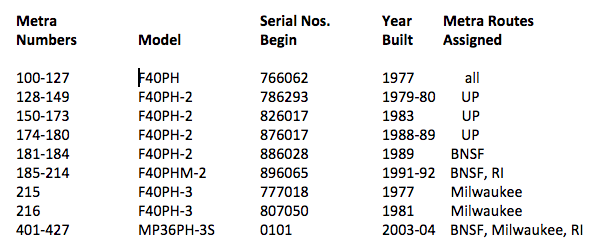Federal regulations pertaining to railroad locomotive emissions are based upon the years the locomotives were manufactured. The older locomotives, those manufactured before 2001, are allowed to the pollute the most. Meanwhile, the newest locomotives, those manufactured from 2015 forward, must comply with strict standards that allow for very little pollution. According to these standards, locomotives manufactured prior to 2001 are allowed to kick off over 20 times the cancer-causing diesel exhaust than the more efficient, newer locomotives. Chicago’s Metra commuter railroad owns around 150 locomotives. It will surprise no one who rides Metra, especially those visiting Chicago Union Station, that the vast majority of Metra’s 150 locomotives are some of the dirtiest, oldest locomotives in service today. Looking at Metra’s locomotive roster (see below), the average manufacture date for its fleet likely falls in the late-1980’s. In fairness, lawyers aren’t known for our math skills. Chicago’s railroad workers who operate and ride in these old locomotives are at increased risk for cancer.
Metra issued a press release in February 2018 trumpeting the purchase of up to 21 “newer” locomotives from Amtrak. These “newer” locomotives were actually manufactured in 1998, which means they will be held to the same pollution standards as the old smokers from the 1970’s and 80’s. In short, in terms of addressing the issues with diesel exhaust inside of Union Station and in its passenger cars, Metra’s purchase of 21 hand-me-down locomotives will change virtually nothing. Therefore, Metra passengers, locomotive engineers, conductors, onboard personnel and station workers will continue to suffer the same diesel exhaust exposures. This situation remains unchanged as they have for the past 40 years. With regard to addressing the diesel exhaust issue, underfunded Metra continues to kick the can down the road.
As a result of Metra’s short-sidedness, employees of Union Pacific, BNSF, Amtrak, and Metra will continue to endure daily exposures to excessive levels of diesel exhaust. These chronic exposures can lead to cancers of the lung, bladder, kidney, colorectal, stomach and throat. Furthermore, diesel exposures can also cause blood and bone marrow disorders. These include Acute Myeloid Leukemia, Non-Hodgkin’s Lymphoma, Multiple Myeloma, Chronic Lymphocytic Leukemia and Aplastic Anemia. If you or a loved one has worked for a railroad around Chicago and been diagnosed with cancer or leukemia, call Chicago’s railroad cancer law firm today at (312) 877-5588. Speak to a railroad cancer lawyer today!
Metra Locomotive Roster


